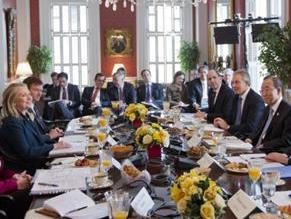|
World Jewish News

The Quartet representatives who met at Blair House in Washington on Wednesday issued a statement which stopped far short of Palestinian hopes that it would blame settlement construction for the impasse in the diplomatic process.
|
Israel PM Netanyahu to seek direct talks with Abbas at next week Fayyad meet
12.04.2012, Israel and the World Israeli Prime Minister Benjamin Netanyahu will suggest to Palestinian Authority Prime Minister Salam Fayyad when they meet next week that the level of talks between the two sides be upgraded, and that he meet directly with PA President Mahmoud Abbas.
The last time Abbas and Netanyahu met was at the end of September 2010.
Meanwhile, the Quartet representatives who met in Washington on Wednesday issued a statement which stopped far short of Palestinian hopes that it would blame settlement construction for the impasse in the diplomatic process.
The last paragraph of the 11paragraph Quartet statement "expressed concern about unilateral and provocative actions by either party, including continued settlement activity, which cannot prejudge the outcome of negotiations, the only way to a just and durable solution to the conflict."
The statement urged both sides to merely "strengthen and improve the climate for a resumption of direct negotiations."
US Secretary of State Hillary Clinton, Russian Foreign Minister Sergei , Quartet Envoy Tony Blair, UN Secretary-general Ban Ki-moon, EU foreign policy chief Catherine Ashton and Jordanian Foreign Minister Nasser Judeh attended the meeting at Blair House in Washington. Jordan – which not a member of the Quartet – sponsored a round of Israeli-Palestinian talks in Amman in January.
Israel’s Prime Minister’s Office issued a communiqué welcoming the Quartet statement "that calls for a continuation of direct talks without pre-conditions."
But Palestinian negotiator Saeb Erakat said the Quartet needed to find a way of dealing with the issue of settlements.
"The Quartet needs a mechanism to compel Israel to stop settlement and to act on the two-state solution," he told AFP.
Netanyahu is to hold a rare meeting with his Palestinian counterpart and two other senior officials from Ramallah in Jerusalem on April 17, a spokesman from his office said earlier.
It will be the first top-level meeting between the two sides since the peace process ground to a halt more than 18 months ago in a bitter dispute over Jewish settlement building.
Israel and the Palestinians are expected to exchange letters in the coming week, with each side outlining its demands for a resumption of peace talks.
Fayyad is expected to deliver a letter to Netanyahu spelling out the Palestinian position on the talks. A few days later, Netanyahu’s negotiator Yitzhak Molcho is expected to deliver a letter in response to Abbas.
Next week's rare encounter between Netanyahu and Fayyad will be the first high-level talks in more than 18 months.
"The meeting will take place in Jerusalem, probably at the Prime Minister's office," Netanyahu's spokesman Ofir Gendelman told AFP, confirming the two would meet on April 17.
The Quartet statement encouraged Israel and the Palestinian Authority "to cooperate to facilitate the social and economic development of Area C, which is of critical importance for the viability of a future Palestinian state as well as for its Palestinian inhabitants to be enabled to lead a normal life."
Area C is the part of the West Bank under full Israeli control, and in recent months there has been talk of the Palestinians – supported by certain European countries – unilaterally starting projects in that area.
Israeli officials said that what was important about the Quartet statement was that it called for developments in Area C through Israeli-palestinian cooperation. Tony Blair, the Quartet's envoy, has been working with Israel to allow more Palestinian economic activity in that area, but the Fatah and Hamas reconciliation agreement signed in Doha in February temporarily shelved those plans.
The statement also condemned the rocket attacks from Gaza, without blasting Israel for its retaliatory military actions.
EJP
|
|
